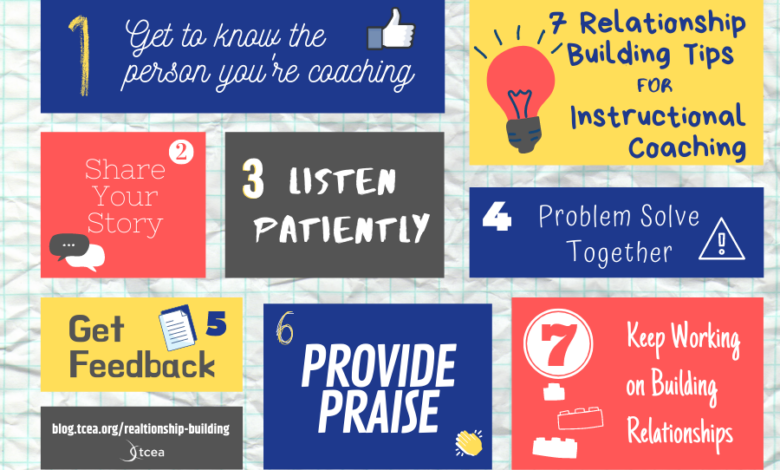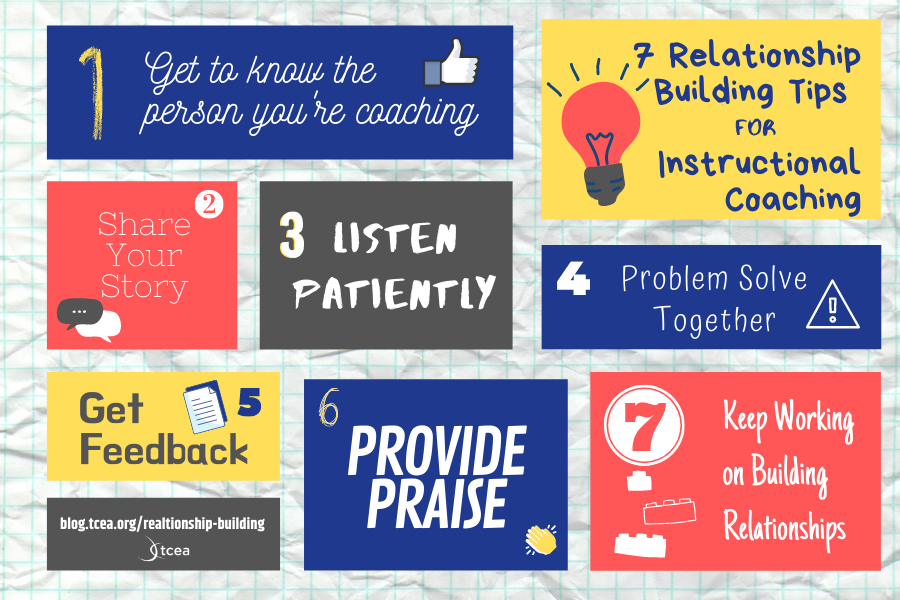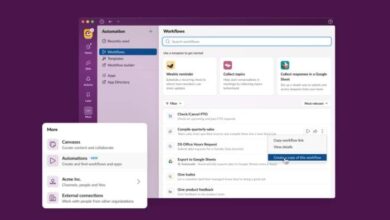
How to Build Relationships with Instructional Coaches
How to build relationships with instructional coaches? It’s a question many teachers ask themselves, especially those who want to grow and improve their teaching practices. Instructional coaches are invaluable resources in the educational landscape, offering guidance, support, and professional development opportunities to educators.
Building a strong relationship with your coach can unlock a wealth of benefits, enhancing your skills and ultimately benefiting your students.
Think of your instructional coach as a trusted partner in your professional journey. They’re there to help you navigate the challenges of teaching, celebrate your successes, and guide you towards achieving your personal and professional goals. By understanding their role, establishing open communication, and actively engaging in the coaching process, you can create a dynamic and rewarding partnership that will propel your teaching to new heights.
Understanding the Role of Instructional Coaches: How To Build Relationships With Instructional Coaches
Instructional coaches play a crucial role in supporting teachers and improving student learning outcomes in educational settings. They act as mentors, guides, and collaborators, working closely with teachers to enhance their instructional practices and foster a culture of continuous professional development.
Key Responsibilities and Goals of Instructional Coaches
Instructional coaches are responsible for a variety of tasks aimed at improving teaching and learning. Their primary goals include:
- Providing individualized support to teachers:Instructional coaches work one-on-one with teachers to identify areas for improvement, set goals, and develop strategies to enhance their teaching practices.
- Facilitating professional development:They design and deliver professional development workshops, seminars, and other learning opportunities to help teachers acquire new skills and knowledge.
- Promoting collaboration among teachers:Instructional coaches encourage teachers to share best practices, collaborate on projects, and learn from each other’s experiences.
- Analyzing student data:They help teachers interpret student assessment data to identify trends, strengths, and areas for improvement in instruction.
- Promoting the implementation of new initiatives:Instructional coaches work with teachers to adopt and implement new educational programs, technologies, or instructional strategies.
- Advocating for teachers:They act as a liaison between teachers and school administrators, advocating for their needs and providing support for their professional growth.
Value and Impact of Instructional Coaches on Teacher Development and Student Learning
Instructional coaching has a significant positive impact on teacher development and student learning. Here’s how:
- Enhanced Teacher Skills and Knowledge:Through individualized support and professional development, coaches empower teachers to refine their instructional practices, develop new skills, and stay abreast of current educational trends.
- Increased Teacher Confidence and Motivation:Coaches provide ongoing support and encouragement, fostering a sense of confidence and motivation among teachers, leading to increased engagement in their professional growth.
- Improved Student Outcomes:By supporting teachers in improving their instructional practices, coaches indirectly contribute to improved student learning outcomes, such as higher test scores, increased engagement, and better understanding of concepts.
- Data-Driven Decision Making:Coaches help teachers use data to inform their instructional decisions, leading to more effective and targeted interventions to meet individual student needs.
- Collaborative Learning Environment:Coaches promote a culture of collaboration among teachers, fostering a supportive and learning-oriented environment where teachers can share best practices and learn from each other.
Types of Instructional Coaching Models
There are several different models of instructional coaching, each with its unique strengths and weaknesses. Some common models include:
- One-to-One Coaching:This model involves an individual coach working directly with a single teacher to provide individualized support and guidance.
- Peer Coaching:This model involves teachers working in pairs or small groups to provide feedback and support to each other.
- Collaborative Coaching:This model involves a team of coaches working together to support a group of teachers, sharing expertise and resources.
- Mentoring:This model involves experienced teachers providing guidance and support to less experienced teachers.
Building a Foundation for Collaboration
Establishing a strong foundation for collaboration with instructional coaches is crucial for teachers to maximize the benefits of this support system. This foundation is built upon open communication, mutual respect, and a shared understanding of goals and expectations.
Building strong relationships with instructional coaches is crucial for any teacher. It’s like having a trusted mentor in your corner, someone who can help you navigate the complexities of the classroom. Speaking of navigating, did you hear about a g specialty foods inc issues voluntary recall of food products containing jif and smuckers peanut butter due to the potential salmonella contamination ?
Anyway, back to instructional coaches, fostering a strong connection with them can make all the difference in your professional growth and development.
Strategies for Clear Communication
Effective communication is the cornerstone of any successful collaboration. Here are some strategies to establish clear communication channels with instructional coaches:
- Regular Meetings:Schedule regular meetings, whether weekly, bi-weekly, or monthly, to discuss progress, challenges, and upcoming plans. These meetings provide a dedicated space for open dialogue and problem-solving.
- Open Dialogue:Encourage open and honest communication. Share your concerns, questions, and ideas openly, and be receptive to feedback and suggestions from the coach.
- Multiple Communication Channels:Utilize a variety of communication channels, such as email, instant messaging, or a shared online platform, to facilitate quick and efficient communication.
- Clear Expectations:Clearly define roles and responsibilities for both the teacher and the coach. This ensures everyone is on the same page and working towards shared goals.
Common Challenges and Barriers
While collaboration with instructional coaches offers significant benefits, it is not without its challenges.
- Time Constraints:Teachers often face heavy workloads and limited time, making it difficult to dedicate sufficient time to collaboration.
- Lack of Trust:Building trust takes time and effort. Some teachers may feel hesitant to share their struggles or seek support from coaches, fearing judgment or criticism.
- Differing Perspectives:Teachers and coaches may have different perspectives on teaching practices and instructional strategies, leading to potential disagreements or misunderstandings.
- Lack of Clarity on Coach’s Role:Sometimes, teachers may not fully understand the role and responsibilities of instructional coaches, leading to confusion or frustration.
Fostering Positive and Respectful Relationships
Building a positive and respectful working relationship is essential for effective collaboration.
- Active Listening:Actively listen to the coach’s feedback and suggestions, even if you don’t agree with them. This demonstrates respect and a willingness to learn.
- Open-mindedness:Approach collaboration with an open mind, willing to consider new ideas and perspectives.
- Mutual Respect:Treat the coach with respect, valuing their expertise and experience.
- Focus on Shared Goals:Remember that collaboration is a partnership. Work together to achieve shared goals, focusing on student learning and improvement.
Engaging in Meaningful Professional Development
Instructional coaches are valuable resources for teachers seeking professional growth. They offer a wealth of knowledge and expertise, facilitating opportunities for learning and development. Actively engaging in these opportunities can significantly enhance your teaching practices and positively impact student outcomes.
Actively Participating in Professional Development Opportunities
Participating in professional development opportunities provided by instructional coaches is crucial for staying current with educational trends and best practices. These opportunities can range from workshops and seminars to individual coaching sessions and peer observations. To maximize the benefits of these experiences, active participation is essential.
Building relationships with instructional coaches is essential for professional growth. They can offer valuable insights and support, but navigating tricky situations like job sharing can be tough. If you’re struggling with a job-sharing arrangement, seeking advice from fellow educators is a great idea.
Check out this article on Ask WeAreTeachers: “Help! I don’t want to job share anymore” for some helpful tips and perspectives. Once you’ve addressed the job-sharing situation, you can strengthen your relationship with your instructional coach by being open to their guidance and actively seeking their support in your professional development.
- Come prepared:Before attending any professional development session, review the materials provided and identify areas where you want to focus your learning. This will help you engage more effectively during the session.
- Ask questions:Don’t hesitate to ask questions during the session, even if they seem basic. This is a valuable way to clarify your understanding and gain insights from the coach’s expertise.
- Share your experiences:Contribute to discussions by sharing your own experiences and perspectives. This helps create a collaborative learning environment and allows others to benefit from your insights.
- Apply learning to practice:After each session, reflect on the key takeaways and identify specific strategies you can implement in your classroom. This will help you solidify your learning and make the most of the professional development opportunity.
Setting Clear Goals and Objectives for Professional Growth
Setting clear goals and objectives for your professional growth is essential for ensuring that you are actively working towards improvement. These goals should be specific, measurable, achievable, relevant, and time-bound (SMART).
- Identify areas for improvement:Reflect on your teaching practices and identify areas where you would like to develop your skills or knowledge. This could involve implementing new instructional strategies, improving classroom management techniques, or enhancing your understanding of specific content areas.
- Collaborate with your coach:Discuss your professional goals with your instructional coach. They can provide guidance, resources, and support to help you achieve your objectives.
- Track your progress:Regularly monitor your progress towards your goals. This might involve keeping a journal, collecting student work samples, or seeking feedback from your coach or colleagues.
Effective Strategies for Applying New Learning to Classroom Practice
Applying new learning to classroom practice is crucial for ensuring that professional development has a tangible impact on student outcomes. It’s not enough to simply attend workshops or read articles; you need to actively implement the strategies and adapt them to your specific context.
- Start small:Begin by implementing one or two new strategies at a time. This will allow you to focus on mastering each strategy before adding more to your repertoire.
- Reflect on your implementation:Regularly reflect on how the new strategies are working in your classroom. Are they effective? Do you need to adjust them? What are the challenges you are facing?
- Seek feedback:Ask your instructional coach, colleagues, or students for feedback on your implementation of the new strategies. This feedback can help you identify areas for improvement and refine your approach.
Seeking Feedback and Support

Seeking constructive feedback from your instructional coach is crucial for your professional growth. It provides valuable insights into your teaching practices, helps identify areas for improvement, and empowers you to become a more effective educator.
Strategies for Receiving and Responding to Feedback
Effectively receiving and responding to feedback is essential to make the most of your coaching sessions. Here are some strategies to consider:
- Active Listening:Pay close attention to your coach’s feedback, asking clarifying questions to ensure you understand their perspective. Avoid interrupting or getting defensive.
- Focus on the Positive:Acknowledge the positive aspects of your teaching highlighted by the coach, reinforcing your strengths and building confidence.
- Seek Specific Examples:Ask your coach for specific examples that illustrate their feedback, making it more concrete and actionable.
- Develop an Action Plan:Collaborate with your coach to develop a plan for addressing the feedback, setting clear goals and timelines for improvement.
Leveraging Coaching Support to Address Teaching Challenges
Instructional coaches are invaluable resources for addressing specific teaching challenges. They can provide guidance, support, and resources to help you overcome obstacles and enhance your teaching effectiveness.
- Identify Specific Challenges:Clearly articulate the challenges you are facing in your teaching, providing specific examples to help your coach understand the situation.
- Collaborate on Solutions:Work with your coach to brainstorm potential solutions, exploring different strategies and resources that might be helpful.
- Implement and Reflect:Implement the proposed solutions in your classroom, reflecting on their effectiveness and making adjustments as needed.
Cultivating a Culture of Continuous Improvement
The journey of professional development is not a one-time event but an ongoing process. To truly thrive as educators, we must embrace a culture of continuous improvement, where reflection, collaboration, and data-driven insights guide our growth. This means actively seeking feedback, analyzing our practices, and constantly striving to enhance our teaching skills.
Building strong relationships with instructional coaches is crucial for teachers, allowing for open communication and collaborative growth. It’s a reminder that even in the midst of tragic events like the brutal beating of a Columbia graduate student in Manhattan , where a mother desperately seeks answers, we must prioritize fostering supportive networks within our professional communities.
By actively seeking feedback, sharing successes, and demonstrating a genuine desire to learn, we can cultivate meaningful connections with coaches who can guide us on our educational journeys.
Incorporating Coaching Insights into Reflection and Self-Assessment
Reflecting on our teaching practices is crucial for identifying areas for improvement. Instructional coaches can provide valuable insights and perspectives that can enhance our self-assessment process. Here are some practical methods for incorporating coaching insights into our ongoing reflection:
- Regular Check-Ins:Schedule regular check-ins with your coach to discuss your teaching practices, share observations, and receive feedback. These check-ins provide a structured opportunity for reflection and growth.
- Video Recordings:Recording your lessons allows you to objectively analyze your teaching style, identify areas for improvement, and gain insights from your coach’s perspective.
- Self-Reflection Journals:Maintaining a journal where you document your teaching experiences, challenges, and successes can help you track your progress and identify patterns in your teaching practices.
- Peer Observations:Observing your colleagues’ lessons and receiving feedback from them can provide a fresh perspective on your own teaching and help you identify areas for improvement.
Creating a Collaborative Learning Environment, How to build relationships with instructional coaches
A collaborative learning environment fosters a sense of shared responsibility for professional growth. When teachers and coaches support each other’s development, the entire school community benefits. Here are some strategies for creating a collaborative learning environment:
- Professional Learning Communities (PLCs):PLCs provide a structured platform for teachers to collaborate, share best practices, and support each other’s professional growth. Coaches can play a vital role in facilitating these communities.
- Peer Coaching:Encourage teachers to engage in peer coaching, where they observe each other’s lessons, provide feedback, and learn from each other’s experiences.
- Mentorship Programs:Establish mentorship programs where experienced teachers guide and support new or less experienced teachers. Coaches can act as mentors or provide guidance to mentors.
- Open Communication:Fostering open communication between teachers and coaches creates a safe space for sharing ideas, concerns, and feedback. This transparency promotes trust and collaboration.
The Role of Data and Evidence in Coaching Conversations
Data and evidence play a crucial role in informing coaching conversations and professional development. By analyzing data, teachers and coaches can identify trends, areas for improvement, and the effectiveness of interventions. Here’s how data can be used in coaching:
- Student Assessment Data:Analyzing student assessment data can reveal patterns in student learning, identify areas where students are struggling, and inform instructional decisions.
- Classroom Observation Data:Coaches can use classroom observation data to provide specific feedback on teaching practices, identify areas for improvement, and suggest strategies for enhancing instruction.
- Teacher Self-Reflection Data:Teachers’ self-reflection data, such as journals or lesson plans, can provide insights into their thinking, challenges, and areas for growth.
Developing a Sustainable Coaching Partnership
A strong coaching relationship goes beyond a few isolated interactions. It’s about building a foundation of trust and mutual understanding that allows both parties to grow and achieve their goals.
To foster a sustainable coaching partnership, it’s crucial to establish clear expectations, cultivate open communication, and ensure the support provided aligns with individual needs and goals.
Key Elements of a Successful Coaching Partnership
A successful long-term coaching relationship is built on several key elements:
- Mutual Respect and Trust:A foundation of respect and trust is essential for open communication and vulnerability. Both parties should feel comfortable sharing their thoughts and concerns openly, knowing they will be met with understanding and support.
- Shared Goals and Objectives:Align on common goals and objectives for the coaching relationship. This ensures everyone is working towards the same outcomes and can track progress effectively.
- Regular Communication:Establish a regular communication schedule for check-ins, feedback sessions, and collaborative planning. This helps maintain momentum and address any challenges promptly.
- Open Feedback:Create a safe space for honest and constructive feedback. Encourage both parties to provide and receive feedback openly and respectfully, focusing on growth and improvement.
- Flexibility and Adaptability:Coaching needs evolve over time. Be prepared to adjust the coaching approach and strategies as individual needs and goals change.
Strategies for Maintaining Open and Honest Communication
Open and honest communication is vital for a successful coaching relationship. Here are some strategies to foster this:
- Active Listening:Practice active listening by paying full attention to the coach’s words, asking clarifying questions, and summarizing their points to ensure understanding.
- Regular Check-Ins:Schedule regular check-ins to discuss progress, challenges, and any changes in needs or goals. This ensures everyone is on the same page and allows for adjustments as needed.
- Transparency and Honesty:Be open and honest about your expectations, challenges, and areas where you need support. This builds trust and allows for more effective problem-solving.
- Feedback Mechanisms:Establish clear feedback mechanisms for both parties. This could involve regular meetings, written feedback, or online tools. Ensure feedback is constructive and focuses on improvement.
- Respectful Dialogue:Approach all conversations with respect and understanding. Avoid defensiveness and strive for a collaborative approach to problem-solving.
Ensuring Coaching Support Aligns with Individual Needs and Goals
To ensure coaching support remains relevant and effective, it’s crucial to regularly assess and adjust the approach:
- Regular Needs Assessments:Conduct regular needs assessments to identify any changes in goals, priorities, or areas needing support. This could involve a simple questionnaire or a more in-depth conversation.
- Goal Setting and Progress Monitoring:Set specific, measurable, achievable, relevant, and time-bound (SMART) goals for the coaching relationship. Regularly track progress towards these goals and adjust the approach as needed.
- Personalized Support:Tailor coaching support to the individual’s learning style, preferences, and specific needs. This could involve different types of activities, resources, or communication styles.
- Flexibility and Adaptability:Be prepared to adjust the coaching approach and strategies as individual needs and goals change. This ensures the support remains relevant and effective over time.
Epilogue
Building a strong relationship with your instructional coach is a journey that requires effort, open communication, and a willingness to learn. It’s about creating a space where you feel comfortable seeking guidance, sharing your challenges, and celebrating your triumphs. Remember, your coach is your ally in this journey, and by working together, you can unlock your full potential as an educator and create a positive impact on your students’ lives.






